Advisory Highlights:
- Preliminary evidence demonstrates that health care systems could incorporate healthy foods into a patient’s care, with resulting improvements in health outcomes, reduced health care utilization and improved cost-effectiveness.
- Food Is Medicine interventions represent a paradigm shift focused on incorporating food and nutrition programs into a health care system to treat, manage and prevent a range of serious and costly chronic health conditions.
- The advisory serves as a roadmap for the research and advocacy initiative led by the Association to identify cost-effective Food Is Medicine interventions for treating and preventing nutrition-related health conditions.
Creating a stronger body of research on the efficacy and value of clinical Food Is Medicine programs is critical to improving the treatment and prevention of many serious chronic health conditions, according to a new American Heart Association Presidential Advisory published today in the Association’s flagship scientific journal Circulation. Given the significant role that food and nutrition play in supporting health, the American Heart Association, a global force for healthier lives for all, recommends approaches to close gaps in research and build a robust evidence base for increasing adoption of clinical Food Is Medicine programs in the U.S.
An estimated 90% of the $4.3 trillion annual cost of health care in the U.S. is spent on medical care for chronic diseases. Unhealthy food intake is a major risk factor for many of these diseases. Healthy food is not accessible or affordable for many people in the U.S., making it difficult to apply clinical food-based interventions that treat and prevent disease. Recent research demonstrates that health care systems may be able to help patients access healthy foods, resulting in improved health, reduced need for health care and better cost-effectiveness.
“To unlock the potential of Food Is Medicine and make it a regular and reimbursable component of health care, we need an ambitious and coordinated research approach,” said Kevin G. Volpp, M.D., Ph.D., FAHA, American Heart Association volunteer, chair of the Presidential Advisory writing group, director of the Center for Health Incentives and Behavioral Economics at the University of Pennsylvania and research lead of the Association’s Food Is Medicine Initiative. “By addressing research gaps and integrating research efforts in collaboration with stakeholders nationwide, we will fuel cross-sector efforts that ensure Food Is Medicine programs improve health costs effectively and are feasible in practice.”
Mario Herrero, professor in the Cornell CALS Department of Global Development and Director of Food Systems & Global Change, served as a co-author on the Presidential Advisory.
“Food is Medicine approaches exemplify the synergy of promoting healthy diets within healthcare for sustainable food systems,” said Herrero, also a Cornell Atkinson Scholar and the Nancy and Peter Meinig Family Investigator in the Life Sciences.
“This application could even bridge the gap between the healthcare sector and sustainable environmental practices. Imagine receiving a prescription for nutritious food that considers environmental preservation. This not only promotes health equity across socio-economic backgrounds but also safeguards our planet's boundaries in food production. It's health equity and planetary well-being in one bite."





